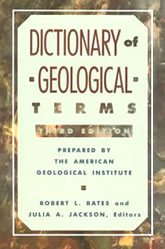Geological Terms Beginning With "X"
For terms beginning with other letters, please click below
|
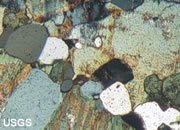
Xenoblast
A crystal that has grown in a rock during the process of metamorphism and which has not developed its characteristic crystal faces because of space limitations. These crystals typically have boundaries that are straight or that conform to the shape of adjacent crystals. The photo shows quartz and feldspar grains in a gneiss.
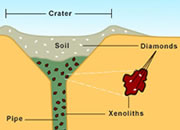
Xenolith
A preexisting rock that has been incorporated into magma without melting. When the magma crystallizes, the preexisting rock fragment is known as a xenolith. Most diamonds found at or near Earth's surface are in xenoliths ripped from the mantle during the deep-source volcanic eruption that delivered them up into the crust.
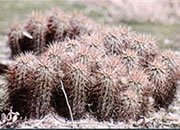
Xerophyte
A plant that can survive in a very dry location or climate because it has a well-developed means of storing and conserving water. The image shows a group of cacti living on a desert floor.
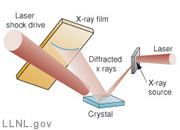
X-ray Diffraction (XRD)
A technique used to identify minerals and other crystalline materials by bombarding them with X-rays. Planes of repetition within the atomic structure of the mineral diffract the X-rays. The pattern of diffraction is unique for each mineral structure and can be used for mineral identification. This method of identification is much more reliable than hand-specimen identification and is used when hand-specimen identification is not possible, difficult, or has produced questionable results.
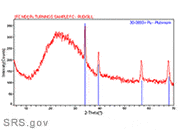
X-ray Diffractogram
A printed or digital record of an x-ray diffraction analysis. It shows the angle of diffraction on the horizontal axis and the intensity of diffraction on the vertical axis. Peaks on the diffractogram are characteristic of the material being examined and can be compared with reference diffractograms to identify minerals and other crystalline compounds.
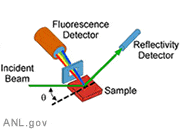
X-ray Fluorescence (XRF)
A technique used to determine the elemental composition of a specimen by bombarding the material with x-rays. The x-rays excite the atoms in the specimen, causing them to emit x-rays of a longer wavelength. These are detected by the analytical equipment, and on the basis of comparison with known standards, the elemental composition of the specimen is determined. X-ray fluorescence can be especially valuable because it can be used as an aid in identifying materials that are not crystalline and thus cannot be identified by x-ray diffraction.
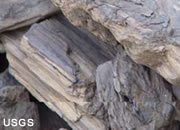
Xyloid Coal
A type of lignite coal that displays the fibrous structure of the wood. Also known as "xyloid lignite."
|
Dictionary of Geological Terms - Only $19.99 All scientific disciplines have an essential vocabulary that students and professionals must understand to learn and communicate effectively. A geology dictionary that is used regularly is one of the most important tools for developing professional competence. A good dictionary should be on the desk of every geologist and within easy reach. This dictionary is compact and inexpensive at only $19.99. More information. |
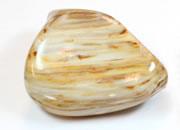
Xylopal
An opalized wood. Forms when opal (usually common opal) infills the cavities and replaces the organic material of a piece of wood. Sometimes the wood grain or cellular details of the original wood can be seen.
|
| More General Geology |
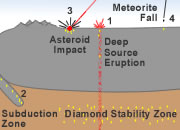 |
Diamonds from Coal? |
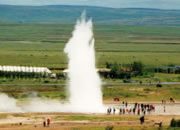 |
What is a Geyser? |
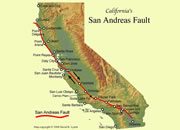 |
What is the San Andreas Fault? |
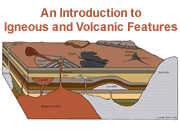 |
Igneous and Volcanic Features |
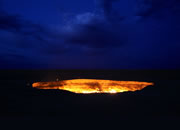 |
The Doorway to Hell |
 |
Topo Maps |
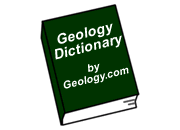 |
Geology Dictionary |
 |
Gifts That Rock |

Find Other Topics on Geology.com:
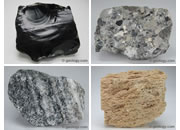
|
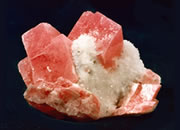
| ||

|

| ||
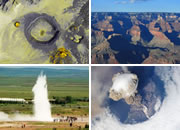
|

| ||

|
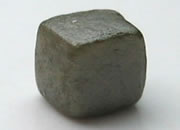
|

